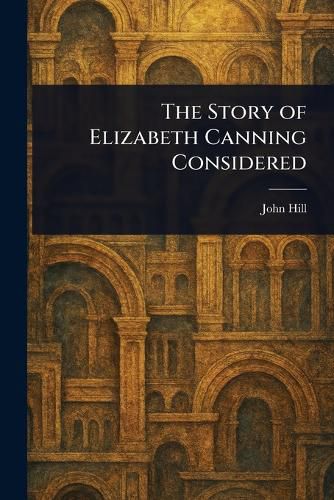Readings Newsletter
Become a Readings Member to make your shopping experience even easier.
Sign in or sign up for free!
You’re not far away from qualifying for FREE standard shipping within Australia
You’ve qualified for FREE standard shipping within Australia
The cart is loading…






This title is printed to order. This book may have been self-published. If so, we cannot guarantee the quality of the content. In the main most books will have gone through the editing process however some may not. We therefore suggest that you be aware of this before ordering this book. If in doubt check either the author or publisher’s details as we are unable to accept any returns unless they are faulty. Please contact us if you have any questions.
Delve into the captivating 18th-century true crime case of Elizabeth Canning with "The Story of Elizabeth Canning Considered" by John Hill. This meticulously prepared print edition explores the notorious perjury trial that gripped England. A fascinating study in legal history, the book examines the details surrounding the accusations against Canning, offering insight into the social and judicial complexities of the era.
Unravel the layers of this enduring historical puzzle as Hill considers the evidence and circumstances surrounding the case. Perfect for readers interested in true crime, British history, and the intricacies of the legal system, this volume provides a compelling look at a trial that continues to spark debate and intrigue centuries later. Explore the details of this landmark case and consider for yourself the story of Elizabeth Canning.
This work has been selected by scholars as being culturally important, and is part of the knowledge base of civilization as we know it.
This work is in the public domain in the United States of America, and possibly other nations. Within the United States, you may freely copy and distribute this work, as no entity (individual or corporate) has a copyright on the body of the work.
Scholars believe, and we concur, that this work is important enough to be preserved, reproduced, and made generally available to the public. We appreciate your support of the preservation process, and thank you for being an important part of keeping this knowledge alive and relevant.
$9.00 standard shipping within Australia
FREE standard shipping within Australia for orders over $100.00
Express & International shipping calculated at checkout
Stock availability can be subject to change without notice. We recommend calling the shop or contacting our online team to check availability of low stock items. Please see our Shopping Online page for more details.
This title is printed to order. This book may have been self-published. If so, we cannot guarantee the quality of the content. In the main most books will have gone through the editing process however some may not. We therefore suggest that you be aware of this before ordering this book. If in doubt check either the author or publisher’s details as we are unable to accept any returns unless they are faulty. Please contact us if you have any questions.
Delve into the captivating 18th-century true crime case of Elizabeth Canning with "The Story of Elizabeth Canning Considered" by John Hill. This meticulously prepared print edition explores the notorious perjury trial that gripped England. A fascinating study in legal history, the book examines the details surrounding the accusations against Canning, offering insight into the social and judicial complexities of the era.
Unravel the layers of this enduring historical puzzle as Hill considers the evidence and circumstances surrounding the case. Perfect for readers interested in true crime, British history, and the intricacies of the legal system, this volume provides a compelling look at a trial that continues to spark debate and intrigue centuries later. Explore the details of this landmark case and consider for yourself the story of Elizabeth Canning.
This work has been selected by scholars as being culturally important, and is part of the knowledge base of civilization as we know it.
This work is in the public domain in the United States of America, and possibly other nations. Within the United States, you may freely copy and distribute this work, as no entity (individual or corporate) has a copyright on the body of the work.
Scholars believe, and we concur, that this work is important enough to be preserved, reproduced, and made generally available to the public. We appreciate your support of the preservation process, and thank you for being an important part of keeping this knowledge alive and relevant.